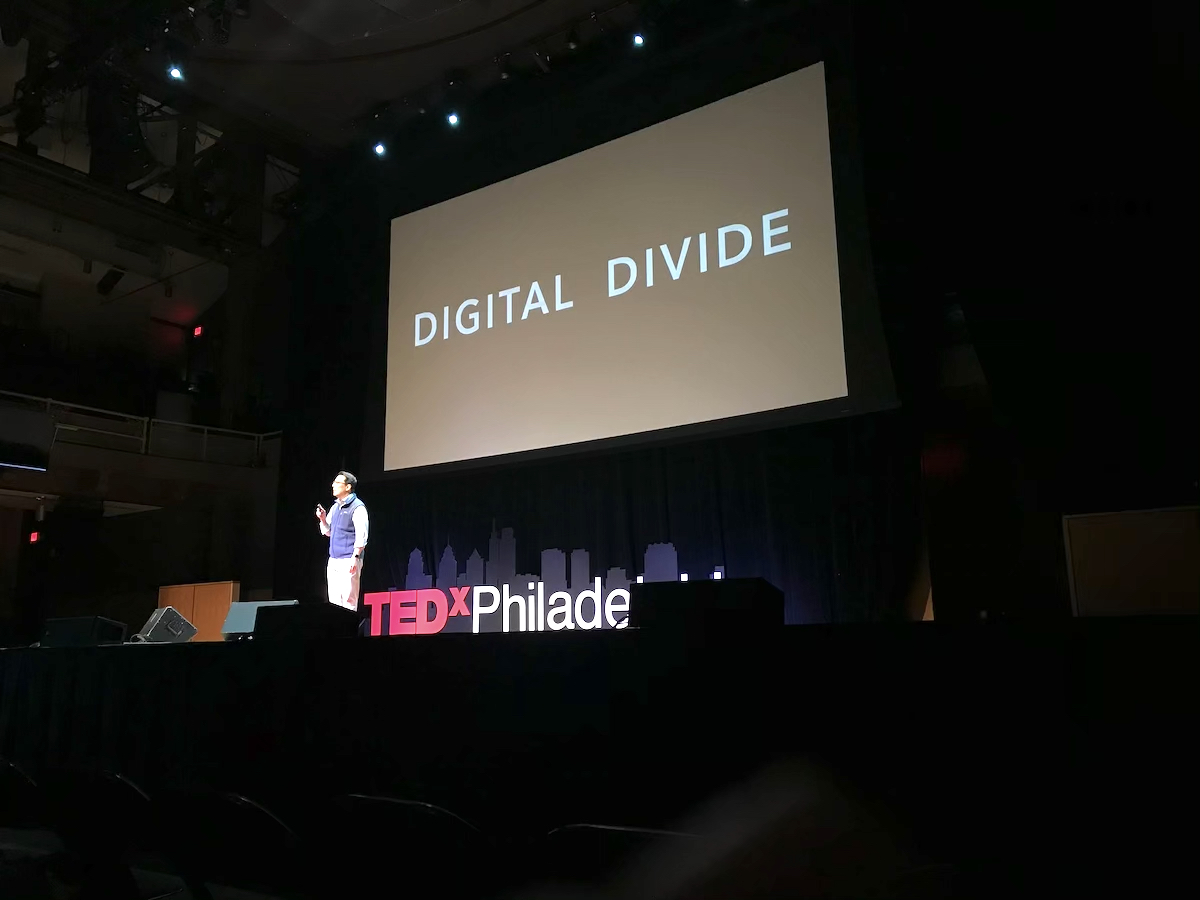Kids shouldn’t be encouraged to be like the founders of Microsoft, Apple or Facebook, says Youngmoo Kim, a Drexel University professor and founder of the ExCITe Center, which intersects tech and art. Instead, tech needs thinkers like Louis Armstrong, Diana Ross or Grandmaster Flash — people who took risks and added something new to their craft.
“In tech, we have our own classical giants —Bill Gates, Steve Jobs and Mark Zuckerberg,” Kim said. “And our society, in some ways, has been so blinded by their success to an extreme view that tech can solve any problem. But if we ask all to follow only their traditions, how will we ever see something that shakes those traditions, like jazz, like Motown or the hip-hop of technology?”
Under the theme of “Unintended Consequences,” Kim focused on tech’s lack of diversity in his TEDxPhiladelphia talk on Wednesday. The big lesson: A culture shift needs to happen to reverse the digital divide it’s widening.
Here’s some knowledge that Kim dropped about lessening that divide:
Focus on equity, not access
By equity, Kim means “equal economic opportunity through technology.” The ingenuity of an idea doesn’t matter until people across all socioeconomic backgrounds can use it for their gain.
“I have to admit that for many years, I was complicit in this kind of thing, that if you simply make the tech good enough, then we would achieve equity,” Kim said. “But as Columbia professor and founder of the #HipHopEd movement Chris Emdin has succinctly put it, you can’t just tech away your problems.”
Examine the ‘monoculture’ of tech — and what you can do
Yes, tech is overwhelmingly male and white. What’s even more concerning is the field has known this for a while, but the tide still has not changed, Kim said.
He used higher ed stats to illustrate his point: In 2002, 3.6% of bachelor’s degrees, 1.3% of masters degrees and 1.3% of Ph.D.s in the computing field were awarded to Black students. Fifteen years later, the numbers weren’t much more promising: 3.7% of bachelor’s degrees and 1.6% of master’s degrees were awarded to Black students. Only 18 Ph.D.s in the computing field were given to Black people in 2017, which is eight more than in 2002.
After excusing himself, Kim asked higher ed folks, “What the hell are you waiting for?”
“We should be the ones ahead of the curve, not behind it,” Kim said. “They say we have a STEM crisis in higher education. No, we have a culture crisis, and we can’t tech our way out of that. Stop trading upon superficial STEM deficits, which have more to do with the student’s ZIP code than their ability to code.”
People in technology can check out Code2040, named after the beginning of the decade when the U.S. is projected to have more people of color than white people, Kim said. The nonprofit focuses on equity in the tech field for the Black and Latinx communities.
Consumers of tech should inform themselves about the companies they buy services and products from, Kim said, by looking at their annual diversity reports (see Google’s here). Organizations like the Algorithmic Justice League (AJL) also make it their mission to call out biases in coding, like facial recognition. An AJL study found that the facial recongition technologies of IBM, Microsoft and Face++ performed the worst on photos of darker-skinned females than any other group.
“Look for companies that are embracing the principles of inclusive design, not only for accessibility, but for broadening representation, and most importantly, maintain a healthy skepticism towards new tech-driven initiatives,” Kim said. “So often, they have blind spots when it comes to equity and inclusion.”
Change the way tech is taught
To encourage kids to take part in tech, Kim doesn’t push STEM education. Instead, the ExCITe Center encourages STEAM, or Science, Technology, Engineering, Arts & Design and Mathematics. STEAM programs include code-and-dance program Black Girls STEAMing through Dance and the Young Dragons, a six-week summer camp for middle school students that the ExCITE Center offers in partnership with the Malcolm Jenkins Foundation.
“Fifty years of math and science emphasis has gotten us into the situation we’re in today,” he said. “We believe that by integrating and celebrating the creativity that’s inherent in both the arts and the sciences, it’s a much more profound way to learn.”
During his talk, Kim noted his privilege as the director of a research institution and Asian-American engineering professor. But he wasn’t always on that side of the equation.
Kim grew up in central Illinois “with an inescapably Korean name” and, later, when he was a musician and performer, he said he’d often look around and feel out of place because of his race. Over time, he’s seen Asian representation advance in films and Broadway musicals — and tech needs a similar shift.
“The tech industry has tried so hard to inject tech culture into the mainstream,” Kim said. “But what it really needs is a culture transplant, replacing an exclusionary, white and Asian male monoculture, with one of equal representation and inclusion.”
Before you go...
Please consider supporting Technical.ly to keep our independent journalism strong. Unlike most business-focused media outlets, we don’t have a paywall. Instead, we count on your personal and organizational support.
3 ways to support our work:- Contribute to the Journalism Fund. Charitable giving ensures our information remains free and accessible for residents to discover workforce programs and entrepreneurship pathways. This includes philanthropic grants and individual tax-deductible donations from readers like you.
- Use our Preferred Partners. Our directory of vetted providers offers high-quality recommendations for services our readers need, and each referral supports our journalism.
- Use our services. If you need entrepreneurs and tech leaders to buy your services, are seeking technologists to hire or want more professionals to know about your ecosystem, Technical.ly has the biggest and most engaged audience in the mid-Atlantic. We help companies tell their stories and answer big questions to meet and serve our community.
Join our growing Slack community
Join 5,000 tech professionals and entrepreneurs in our community Slack today!

The person charged in the UnitedHealthcare CEO shooting had a ton of tech connections

From rejection to innovation: How I built a tool to beat AI hiring algorithms at their own game

Where are the country’s most vibrant tech and startup communities?



